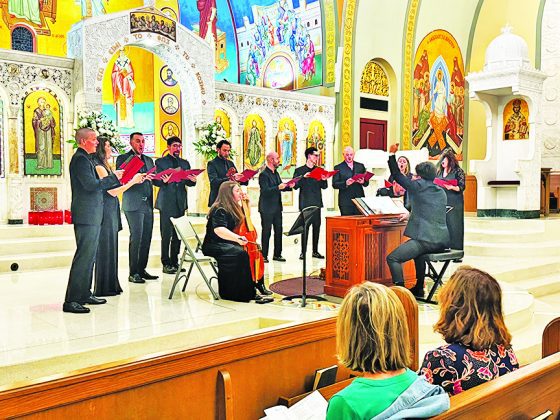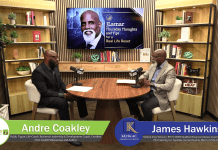|
Getting your Trinity Audio player ready...
|
Images of clean-lined furniture or more simplistic architecture might come to mind when one hears the phrase “mid-century modern.”
However, the post-World War II mindset that sparked this focus on a more minimalist style also stimulated dramatic changes in the music of that time period.
Artists in the mid-20th Century strove to predict and create the art of the future.
Composers like Arnold Schoenberg experimented with new sounds and compositional techniques. R. Murray Schafer went even farther, devising new methods of writing music and delving into sounds and words that could convey images. At the same time, others like Alan Hovhaness and Samuel Barber returned to styles of the past with new understanding.
Conductor James K. Bass explains his musical selections: “Some of these musical arrangements in the program deal with that (post-World War) anxiety. One set, by African-American composers from 1952 to 1962, has a very different angle — expectant and hopeful. I put them on this program to show the diverse approach composers took in relating to the world situation around them.”
Bass is director of Choral Studies at UCLA’s Herb Alpert School of Music at UCLA and associate xonductor at Seraphic Fire.
Seraphic Fire artists will perform two pieces which are mid-century modern settings of ancient texts, and these same words have been set by many, many composers. The audience will get a rare opportunity to compare a 17th Century version of Weepe, O Mine
Eyes to one arranged 300 years later.
Program:
Two Pieces: Opus 42 (1968), Samuel Barber — Twelfth Night and To be Sung on the Water;
The Brightness of our Noon (1954), Alan Hovhaness;
Carols of Death (1949), William Schuman — The Unknown Region and To All, to Each;
Ave Verum Corpus (1972), Imant Raminsh;
Weepe, O Mine Eyes (1959), Halsey Stevens;
Go, Lovely Rose (1954), Halsey Stevens;
Epitaph for Moonlight (1968), R. Murray Schafer;
I shall pass through this world but once (1959), Margaret Bonds;
Daniel, Daniel, Servant of the Lord (1952), Undine S. Moore;
Resignation, Florence B. Price;
Ain’t Got Time to Die (1956), Hall Johnson, and
Chichester Mass (1974), William Albright.
Local performance is Friday, Apr. 26, 8 p.m., at Church of the Little Flower, 2711 Indian Mound Trail, Coral Gables. A Pre-Concert Conversation will be presented one hour prior to each performance.
Tickets and subscriptions are on sale at SeraphicFire.org and by phone at 305-285-9060.
ABOUT US:
For more Miami community news, look no further than Miami Community Newspapers. This Miami online group of newspapers covers a variety of topics about the local community and beyond. Miami’s Community Newspapers offers daily news, online resources, podcasts and other multimedia content to keep readers informed. With topics ranging from local news to community events, Miami’s Community Newspapers is the ideal source for staying up to date with the latest news and happenings in the area.
This family-owned media company publishes more than a dozen neighborhood publications, magazines, special sections on their websites, newsletters, as well as distributing them in print throughout Miami Dade County from Aventura, Sunny Isles Beach, Miami Beach, Coral Gables, Brickell, Coconut Grove, Pinecrest, South Miami, Kendall, Palmetto Bay, Cutler Bay and Homestead. Each online publication and print editions provide comprehensive coverage of local news, events, business updates, lifestyle features, and local initiatives within its respective community.
Additionally, the newspaper has exclusive Miami community podcasts, providing listeners with an in-depth look into Miami’s culture. Whether you’re looking for local Miami news, or podcasts, Miami’s Community Newspapers has you covered. For more information, be sure to check out: https://communitynewspapers.com.
If you have any questions, feel free to email Michael@communitynewspapers.com or Grant@communitynewspapers.com.







